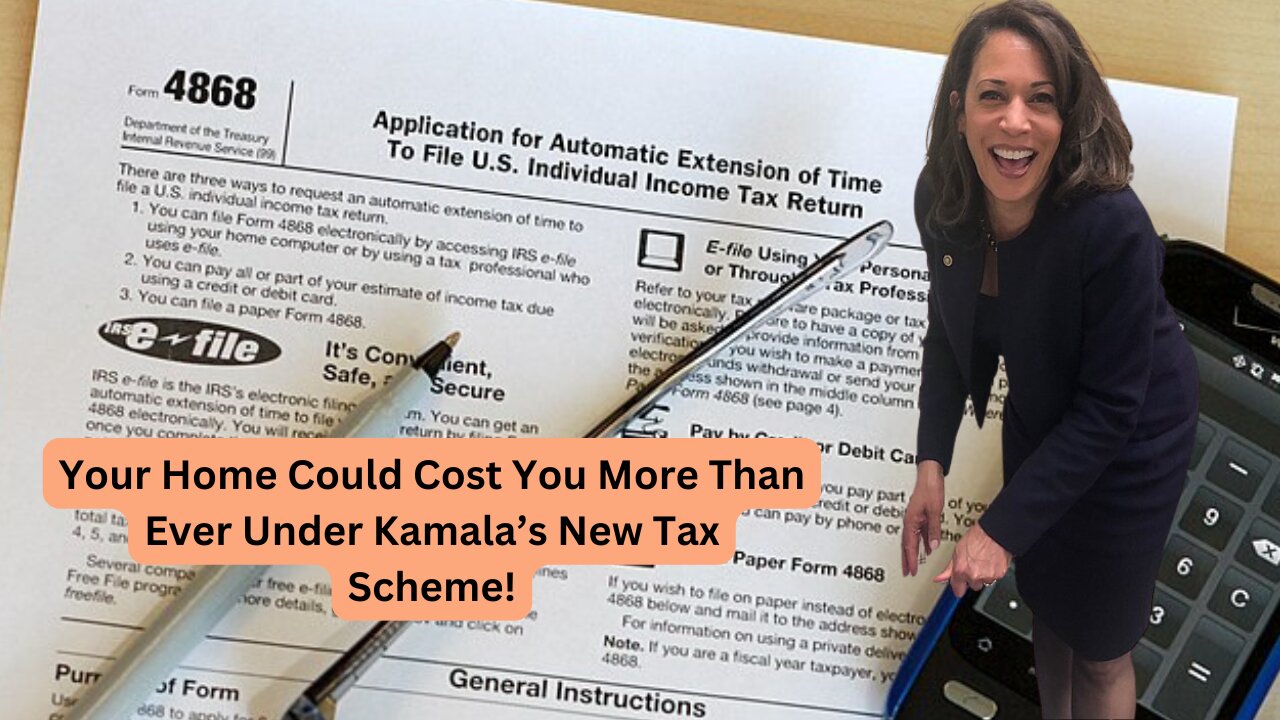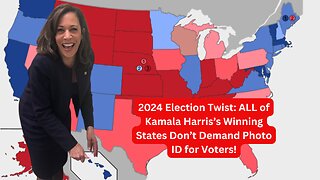Premium Only Content

Could Kamala’s Tax Plan Force You to Sell Your Home? The Reality of Unrealized Capital Gains
Kamala Harris’s populist, socialist agenda includes taxing unrealized capital gains, meaning you would have to pay taxes on the increased value of your stock portfolio or home, even without selling them. But would there be a tax credit if your property loses value?
Taxing unrealized capital gains infringes on personal property rights, discourages savings and investment, and could force homeowners to sell their properties if they don’t have enough liquid funds to cover the tax. This tax applies to the increase in an asset’s value before it’s sold, diverging from the traditional approach where capital gains are taxed only after a sale, when the gains are “realized” and converted into cash.
With this new tax, the government would require individuals to pay taxes on the rising value of assets like stocks, real estate, or other investments, even without a sale or income from them. The underlying goal seems to be preventing wealth accumulation and inheritance transfer. This could create significant financial burdens, particularly for those with wealth tied up in non-liquid assets like real estate, potentially forcing sales just to cover the tax.
Accurately valuing assets on an ongoing basis would also be necessary, but this is especially tricky for non-publicly traded assets like private businesses, intellectual property, or art, where valuations are often subjective. Real estate valuations, even, can be contentious, as seen in Trump’s legal battles in New York.
Market fluctuations further complicate the issue. Would taxpayers receive refunds if asset values decrease? And how would this affect inheritance? Liberals generally oppose property inheritance, but if it happens, would heirs have to pay capital gains tax immediately, possibly forcing asset sales to cover the taxes?
Taxing unrealized gains could discourage long-term saving and investing, as people might shy away from assets that could generate hefty tax bills before yielding financial benefits. It’s unfair to tax “paper gains” before they’re realized, as it targets potential wealth, not actual income, and penalizes those who hold onto assets for the long term. Moreover, it violates property rights by effectively transferring private wealth to the government.
This tax could also have broader economic consequences, like reduced overall investment, slower economic growth, and negative impacts on job creation and innovation. Entrepreneurship, which thrives on the promise of future profits, could suffer, as entrepreneurs might face tax liabilities on unrealized gains before their ventures turn a profit, stifling innovation and reducing economic dynamism.
Such a tax would likely disincentivize saving and investment, leading to reduced capital formation, essential for long-term prosperity. People might prioritize spending over investing or focus only on short-term investments to remain liquid for tax purposes. This could drive suboptimal economic behaviors, like short-termism.
Kamala’s plan to tax unrealized capital gains would expand government power, stifle innovation and job creation, and infringe on property rights, pushing the U.S. further away from a market-based economy. The left supports this idea because it would reduce wealth inequality by impoverishing diligent, prudent investors.
-
 3:48
3:48
Conspiracy Chronicle
2 days ago19 States Won by Kamala Harris Don’t Require Photo ID—What Does This Mean for Election Security?
129 -
 LIVE
LIVE
Nerdrotic
4 hours ago $22.56 earnedHollywood in PANIC! Woke Celebrity Meltdown, Penguin Finale CRUSHES! | Friday Night Tights #328
9,971 watching -
 DVR
DVR
vivafrei
4 hours agoChinese and Indian INFILTRATION in Canadian Government? Live with David Krayden! Viva Frei Live
54.2K22 -
 52:17
52:17
Candace Show Podcast
4 hours agoFight Night! Me VS Marc Lamont Hill On Transgenderism | Candace Ep 104
73K147 -
 1:12
1:12
Mike Tyson
4 hours ago $15.41 earnedIt's a war.
50.4K28 -
 1:04:11
1:04:11
In The Litter Box w/ Jewels & Catturd
23 hours agoProsecute/Fauci | In the Litter Box w/ Jewels & Catturd – Ep. 692 – 11/15/2024
72.9K39 -
 5:17
5:17
BFFs: Dave Portnoy, Josh Richards & Bri Chickenfry
9 days agoSmallest Man
233K24 -
 1:45:03
1:45:03
The Quartering
6 hours agoRFK Big Pharma Meltdown, Alex Jones WIN & Shadow Government To Oppose Trump!
117K40 -
 1:53:23
1:53:23
Tucker Carlson
6 hours agoFasting, Prayer, Meditation, & the Global Persecution of Christians (With Hallow CEO Alex Jones)
161K60 -
 53:03
53:03
Ben Shapiro
6 hours agoEp. 2086 - It’s MAHA TIME: Trump Picks RFK Jr.
123K79